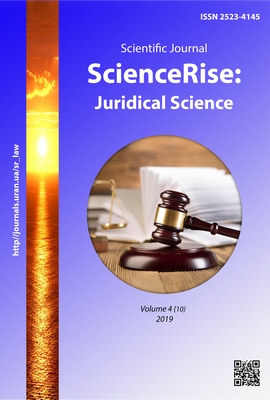Separate discussed questions of standartization of authorities of a head of the pre-trial investigation body
DOI:
https://doi.org/10.15587/2523-4153.2019.188574Keywords:
head, pre-trial investigation body, departmental control, authorities, investigation subdivisionAbstract
The paper is devoted to studying the modern condition of normative-legal regulation of authorities of a head of the pre-trial investigation body. It is noted, that the effective support of realization of criminal proceedings by the pre-trial investigation bodies, declared in art. 2 of the CPC of Ukraine, is impossible without departmental control functioning. According to the actual legislation, realization of such control at a pre-trial investigation by an investigator in criminal proceedings is entrusted to a head of the pre-trial investigation body. It is stated, that the Ukrainian legislation on organization and procedural guidance of a pre-trial investigation needs correspondence for avoiding contradictions, actual for today. Attention is accented that CPC has no foundations, at which a head of the pre-trial investigation body is entrusted to be informed about pre-trial investigation materials that brings an uncertainty element in the work of an investigator.
Such statement is explained by the fact that it is not clear, when and which criminal proceeding is possible to require for studying; how many time is needed by a head for studying it; what decisions may be made according to results of such studying. According to the system analysis of the statements of part 3 art. 40 of the CPC of Ukraine and part 2, art. 312 of the CPC, it is stated, that they don’t correspond to each other. At that art. 40 of the CPC of Ukraine is general and art. 312 of the CPC of Ukraine is special, so the last one is priority. A conclusion was made that legislative gaps as to standardization of authorities of a head of the pre-trial investigation body have the negative influence on the law enforcement activity. So, they must be solved by introducing correspondent changes and additions in the CPC of Ukraine and departmental normative-legal acts, regulating the activity of a head of the pre-trial investigation body, and it concerns both organizational aspects and his/her procedural activity.
References
- Bandurka, O. M. (2005). Upravlinnia v orhanakh vnutrishnikh sprav Ukrainy. Kharkiv, 478.
- Nesterenko, O. S. (2014). Pravovyi status kerivnyka orhanu dosudovoho rozsliduvannia. Problemy zakonnosti, 127, 129–136.
- Drozd, V. H. (2018). Protsesualna samostiinist slidchoho: pytannia teorii ta praktyky. Yurydychnyi naukovyi elektronnyi zhurnal, 5, 190–194.
- Drozd, V. H. (2018). Pravove rehuliuvannia dosudovoho rozsliduvannia: problemy teorii ta praktyky. Odessa: Vydavnychyi dim «Helvetyka», 448.
- Sakal, V. M. (2015). Pravovyi status kerivnyka orhanu dosudovoho rozsliduvannia. Yurydychnyi chasopys Natsionalnoi akademii vnutrishnikh sprav, 2 (10), 182–192.
- Salo, O. M. (2018). Realizatsiia povnovazhen kerivnykom orhanu dosudovoho rozsliduvannia pry provedenni nehlasnykh slidchykh (rozshukovykh) dii. Kyiv, 254.
- Konstytutsiia Ukrainy (1996). Zakon Ukrainy No. 254k/96-VR. 28.06.1996. Available at: https://zakon.rada.gov.ua/laws/show/254%D0%BA/96-%D0%B2%D1%80
- Honcharenko, V. H., Nora, V. T., Shumylo, M. Ye. (Eds.) (2012). Kryminalnyi protsesualnyi kodeks Ukrainy. Naukovo-praktychnyi komentar. Kyiv: Yustinian, 1224.
- Darovskikh, S. M. (2015). Nekotorye voprosy osuschestvleniia vedomstvennogo kontrolia pri proizvodstve predvaritelnogo rassledovaniia. Pravoporiadok: istoriia, teoriia, praktika, 4 (7), 26–30.
- Khazikov, A. A. (2015). O nekotorykh problemakh sovershenstvovaniia processualnogo polozheniia rukovoditelia sledstvennogo organa. Obschestvo i pravo, 3 (53), 189–192.
Downloads
Published
How to Cite
Issue
Section
License
Copyright (c) 2019 Sergii Ablamskiy, Victoriia Ablamska

This work is licensed under a Creative Commons Attribution 4.0 International License.
Our journal abides by the Creative Commons CC BY copyright rights and permissions for open access journals.
Authors, who are published in this journal, agree to the following conditions:
1. The authors reserve the right to authorship of the work and pass the first publication right of this work to the journal under the terms of a Creative Commons CC BY, which allows others to freely distribute the published research with the obligatory reference to the authors of the original work and the first publication of the work in this journal.
2. The authors have the right to conclude separate supplement agreements that relate to non-exclusive work distribution in the form in which it has been published by the journal (for example, to upload the work to the online storage of the journal or publish it as part of a monograph), provided that the reference to the first publication of the work in this journal is included.








